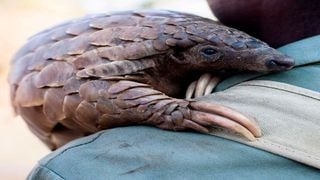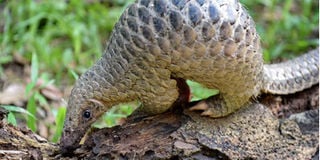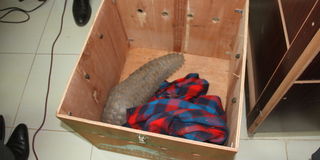
A pangolin.
| Getty ImagesNarok
Premium
Pangolin’s day in court: Scaly mammal at centre of trafficking case
Picture this: A plane lands at the Maasai Mara University and everybody expects to see a VIP disembark and wave at the crowd. Instead, a wildlife ranger comes out, carrying a box with a pangolin inside!
This actually happened on Monday. The officials from the Kenya Wildlife Service (KWS) moved the animal from Empaash in Narok South Sub-County to the Narok law courts, where it was evidence in a case in which three people were charged with being in illegal possession of the pangolin.
When it was presented in court, everyone wanted to have a glimpse of it, perhaps because it is a rare mammal and probably because the world last year blamed it for causing the Covid-19 pandemic.

A KWS officer carries a box containing a live pangolin on March 15, 2021.
The courtroom came to a standstill as the KWS officer opened the box to show the animal to the judge, in the case in which Mr Daniel Kisaika, Mr Daniel Tonyua and Mr Sanchan Kisaika have been charged with locking up the animal in their house.
So why all the fuss about the animal? After all, it is just another shy, scaly, toothless animal with a tongue longer than its body and scales that make up about 20 per cent of its total body weight. Right?
Well, the fact is, the pangolin is believed to be the world’s most trafficked non-human mammal.
The world over though, the pangolin is one of the most endangered animal species, due to the demand for its body parts, which are used by different communities for different reasons, including as ornaments, in medicine and superstition, among others.

In this file photo taken on June 30, 2017, a juvenile Sunda pangolin feeds on termites at the Singapore Zoo.
In Asian countries and in parts of Africa, pangolin scales are also believed to be a cure for a variety of ailments including cancer, skin and liver diseases. There is no scientific proof of this.
The World Wide Fund for Nature (WWF) states that pangolins are on high demand in countries like China and Vietnam as their meat is considered a delicacy and pangolin scales are used in traditional medicine and folk remedies.
All pangolin species, who live predominantly on a diet of ants and termites, are accorded the highest protection status under the Convention of International Trade in Endangered Species of Wild Fauna and Flora (Cites) due to their exploitation in illegal trade.
Kenya has no statistics on the number of pangolins in the country, but conservationists have been worried that the high rate of poaching is subjecting them to the risk of extinction.

A pangolin inside a wooden box after it was produced at the Narok Law Courts after three people from the same family were arraigned in court for handling it without a permit on March 15, 2021.
Based on reported seizures between 2011 and 2013, an estimated 116,990 to 233,980 pangolins were killed in Africa and Asia, which represents only the tip of the trade. Experts at WWF believe that seizures represent as little as 10 per cent of the actual volume in pangolins in illegal wildlife trade.
Communication officers at the Maasai Mara Wildlife Association said due to Covid-19 restrictions, non-state partners had to scale down operations, including monitoring and surveillance of the Kenyan pangolin population and training and paying conservancy scouts.
The Maasai Mara pangolin project says plans to begin the Kenya pangolin census and conduct baseline surveys were put on hold.
The Maasai call the mammal entaboi, which loosely translates to big problem or an abomination, a disgrace, horror or a marvel – perhaps because of its strange nature and rare sightings. It is also associated with darkness since it only comes out at night.
Many people, including those in their 40s, such as Mr Musa Lakanet from Ewuaso Enkdong village, said they have never seen a pangolin.
“Although I had never seen it before, I became interested in pangolins following some scientists who linked them to the global Covid-19 pandemic. It was amazing to see it in court,” said Mr Lakanet.
KWS records indicate that Kenya is home to three species of pangolins; ground pangolins are found in open bushland, tree pangolins are found in Kakamega forest and the Loita Hills, and the giant pangolin is found in the Lake Victoria Region. Their distribution extends across the South Rift, Narok County, Taita Taveta, Mwingi, Kerio Valley, South Turkana and adjoining areas, in the West of Kenya and into West Pokot.
During the pandemic, there have been numerous sightings and rescues of pangolins captured by poachers across the country. Last year, another three Kenyans were arrested by KWS officers on September 22 in Likoni, Mombasa, with a pangolin.
On December 27, six people were arrested after being found in possession of pangolin scales inside a vehicle belonging to a clearing and forwarding agent based at the Jomo Kenyatta International Airport in Nairobi.
They were found with five boxes of pangolin scales weighing 157 kilogrammes and worth Sh157 million.

Messrs Daniel Kisaika, Tonyua Kisaika and Sanchan Kisaikan, who are accused of dealing with a live pangolin, in court on March 15, 2021.
The six were charged before Kibera Senior Principal Magistrate Phillip Mutua where they denied the charges. They were released on Sh5 million bond each.
The major seizure in Kenya points to the illegal trade of pangolins continuing, with the country as a source market and transit point.
The Environmental Investigation Agency’s Out of Africa Report ranks Kenya at position 7 among African countries implicated in ivory and pangolin scales trafficking.
Nigeria ranks first, having seized 167,594 kilogrammes of pangolin scales from 2015 to 2019. Uganda ranked fourth, having seized 9,199 kilogrammes and Kenya is seventh with 1,396 scales seized.
The unique ant-eaters have very long and sticky tongues, and when they sense danger or discomfort, they curl up into a ball as a defence mechanism. In doing this, they protect their head and underbelly, their outer layer of scales forming a tough armour to protect them from lions, hyenas and leopards.
In the Narok case, the court ordered the three members of the same family who were found in possession of the mammal to be released on a Sh1 million bond each, plus two sureties of a similar amount, meaning they must pay Sh3 million each.
If found guilty, the three accused will face a fine of not less than one Sh1 million or an imprisonment term of not less than five years, or both.





